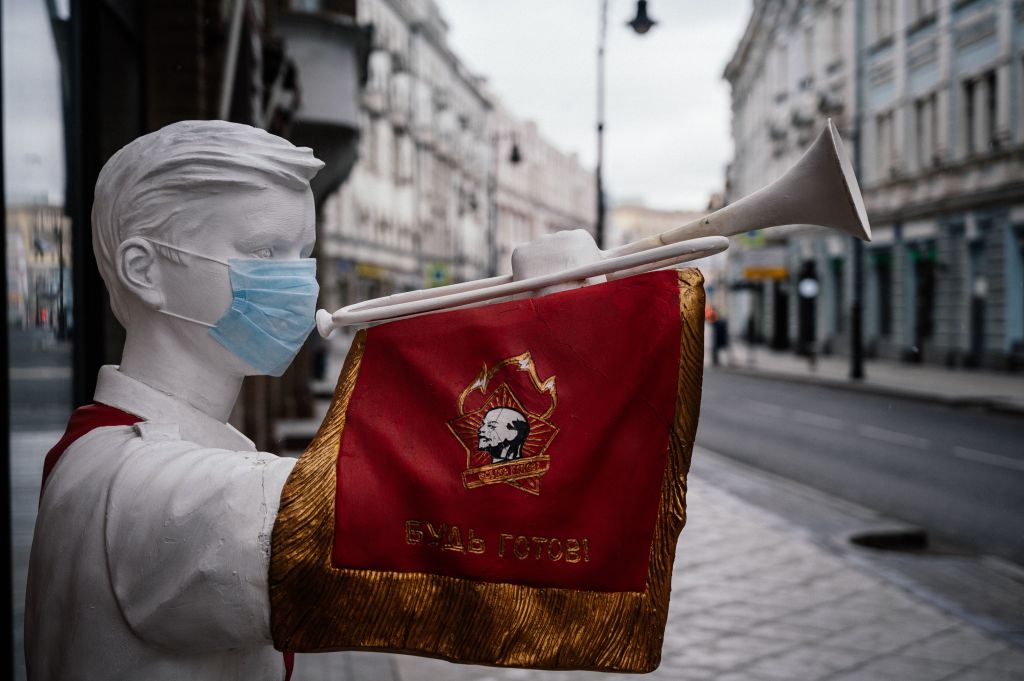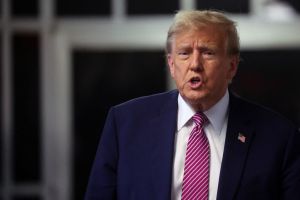Russia made headlines last August when it triumphantly unveiled its pioneering coronavirus vaccine, Sputnik V. But now, nearly a year on, it has a more dubious claim to fame — as the anti-vaxx capital of the world.
For months now, sparkling clean pop-up clinics offering jabs to the public, with no appointment needed, have been open for business in shopping malls and food halls across the country. With three domestic formulas approved and millions of vials in reserve, there is no shortage of doses for anyone who wants one. And yet, Russians just aren’t signing up.
New data from research giant Morning Consult, based on 75,000 weekly interviews with people across the globe, has found the nation has the highest level of vaccine skepticism of anywhere surveyed. More than half of respondents say they are unwilling or uncertain about having the shot, compared to fewer than one in three in the US, which comes in at second place. While 14 million shots have been given, less than 10 percent of the population is estimated to have been immunized.
With case levels plateauing at a manageable level for months, and most regions relaxing restrictions after initially tough rules in the first half of last year, many in the country saw little reason to be vaccinated when they were already able to go about their lives normally. As the rest of Europe labored under lockdowns, young Russians, many of whom had already had the virus, partied on packed dance floors and businesses boomed with clients unable to travel overseas.
Now, a new wave of infections with the virulent Indian strain has taken authorities by surprise. In the past two weeks, the number of positive tests has more than doubled to a daily total of over 17,000.
Moscow’s mayor, Sergei Sobyanin, has warned the situation in the city is ‘rapidly deteriorating,’ with numbers rising to record levels. Worse still, the chief of one of the top hospitals has said more patients than ever are on ventilators — and the wards will be full within weeks if nothing is done.
In response, the Russian capital has introduced a ban on nightlife, forcing bars, clubs and restaurants to close at 11 p.m. Public-facing industries like hospitality and transport will be required to ensure at least 60 percent of their staff have a shot, or face hefty fines. Officials have confirmed businesses can suspend employees with no pay if they refuse to get vaccinated, effectively demanding they choose between getting a shot or losing their salary.
Those declining the vaccine will also now be refused non-urgent routine treatment at the city’s hospitals to avoid outbreaks, and cannot make appointments with legal officers in person. In addition, regions across the country have introduced measures requiring domestic travelers to quarantine when they arrive, in an effort to prevent the virus spreading to other areas.
Although the new measures have reportedly seen a fourfold increase in those requesting a vaccine, there is little public support for restrictions. A poll by Moscow’s Levada center, registered as a ‘foreign agent’ by Russia’s Ministry of Justice over links to overseas funding, found earlier this month that more than half of Russians are unconcerned about contracting the virus, even though two-thirds believe they’ve not yet had it. Among younger people in particular, there appears to be an almost total sense of invulnerability.
While picnic invites and tips for bars that might stay open past the curfew fly around on messaging groups, mostly inaccurately, it seems some are willing to go ever further to frustrate attempts to contain the spread of the virus.
On Friday, police began a manhunt after Moscow’s central government building received a bomb threat. The anonymous email demanded officials drop the mandatory vaccination program, as well as rules requiring citizens wear masks and gloves in public places. Ultimately, no device was found.
‘I’ll fight to the end,’ one Russian friend said when the plans to require jabs for service workers were announced, even though more than 60 countries have approved Sputnik V and published data shows it is among the safest and most efficacious formulas available worldwide.
The only thing that would change her mind, she added, would be the EU allowing travel for those who have had Russian vaccines. At present, there is no way for Russians to visit much of the continent without quarantining, despite Brussels easing the rules for immunized American and British tourists.
‘There is nothing to be afraid of here,’ President Vladimir Putin said earlier this month, trying to reassure Russians wary of the jab. However, the government is fighting a persistent problem with misinformation. One TikTokker racked up millions of views on a video in which he claimed his face had been paralyzed after taking the vaccine. While unverifiable, even if true, such symptoms are thought to be a very rare consequence of all vaccines. But tellingly his story was more widely shared than appeals from health officials.
The international narrative has hardly helped attitudes in the country either. ‘Is Russia’s COVID vaccine anything more than a political weapon?’ the Guardian asked in April, drawing its scientific basis into question. Meanwhile the EU has dragged out what should have been a simple evidence review of the formula for months, despite some member states like Hungary pushing ahead and using it anyway.
Russia undoubtedly hopes that its status as a vaccine pioneer and exports to other countries will bring benefits on the world stage. But, facing reluctance back home, the prospect of the country languishing with lockdown measures while much of Europe reopens for business is now the nightmare scenario for the Kremlin.
This article was originally published on The Spectator’s UK website.


















